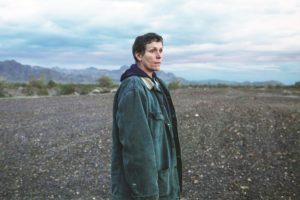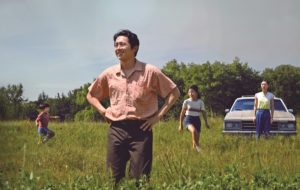The Cape Cinema, 35 Hope Lane in Dennis, is open for the season. Beginning Friday, June 4th, it will screen Oscar-winning Nomadland as well as The Truffle Hunters, a documentary about searching for the prized white Alba truffle. Check out Sunflowers, an immersive film about Vincent van Gogh, beginning Saturday, June 5th. See capecinema.com for show times.
Nomadland
INDIE SCREEN
Hybrid Cinema: From Asia, With Love
Two beautiful films arise from a mix of cultural points of view
Although it has much to recommend it, the film Nomadland, which is playing in theaters (not locally) and streaming on Hulu (free to subscribers), can attribute its extraordinary success, including a best picture win at the Golden Globes and numerous critics’ and festival awards, to its American star and Chinese director.
And rightly so. Frances McDormand plays the film’s central character, Fern, a woman made homeless by the shutting down of the Nevada gypsum factory where her late husband worked. She sets up her world in an ordinary van and travels with the seasons out West from place to place and menial job to menial job. Whom she meets, and the crossroads she encounters, are the thread of narrative in the film and its reason for being. Though it feels, at times, as if it were the exploration of a subculture — it’s based on a nonfiction book that does just that — Nomadland is really just a character study, one that follows the arc of Fern’s self-awareness and our understanding of who she is.

McDormand, a Yale School of Drama grad who won Oscars for her performances in Fargo and Three Billboards Outside Ebbing, Missouri, has made a career of playing unglamorous women. It began in 1984 with the neo-noir Blood Simple — she met her husband, director Joel Coen, at her audition — and the roles she takes on seem only to get juicier with age, which is hardly typical, to say the least. My favorite is the show-business narcissist she played in Laurel Canyon.
With Fern, McDormand inhabits a remarkable character who is unique, someone who rejects her middle-class upbringing for a trailer-trash existence without anger, madness, or doubt. Indeed, as aloof as she might appear (some might say fearful of intimacy), she pushes forward in her life with a sense of wonder and existential confidence. She cannot give up on her attachment to her late husband — wearing his wedding ring and rebuffing a sweet suitor, played by David Strathairn — but none of the indignities of her situation (a bucket as a toilet in her van; needing loans from friends and family to pay for repairs) are enough for her to change her ways.
Of course, part of the reason Fern is so vivid is the work of writer-director Chloé Zhao. Born in Beijing and educated in the U.S., Zhao has an astoundingly clear-headed view of the America that Fern inhabits: the blurred class lines, the sense of place and space out West, and, especially, the mystique of individualism.
The film is stunningly shot in muted color — there’s hardly a wasted moment or camera movement, despite the unhurried pace — and the cast, filled with nonprofessionals, is consistently good, and sometimes poetically so. Zhao’s feel for atmospheric detail recalls Ang Lee; her neorealist style recalls Sean Baker (Tangerine; The Florida Project). Her last film, The Rider, about an injured rodeo star, is similar in approach to Nomadland and equally subtle and moving. This new film solidifies her reputation as a film artist to watch and take seriously.
Another hybrid of Eastern and Western aesthetics is the Korean-American feature Minari, which won best foreign-language picture at the Golden Globes even though it takes place in Arkansas in the 1980s. The film, which premiered at the pre-pandemic 2020 Sundance Film Festival (where it won both the Grand Prize and Audience Award), is available online for a $20 rental on Amazon Prime and other channels. It’s tremendously engaging, a look at an immigrant family struggling to escape factory-like jobs, separating baby chicks by gender at birth, by buying farmland and producing Korean vegetables in the rural South.

The story is semiautobiographical, based on the childhood experiences of writer-director Lee Isaac Chung, and the film is a tightly wound drama filled with slice-of-life quirks. The family’s mom, Monica (Yeri Han), is skeptical of the farming ambitions of her husband, Jacob (Steven Yeun), and invites her down-to-earth aging mom (Yuh-jung Youn) to live with them and look after the kids — precocious, bed-wetting young David (Alan S. Kim) and preteen Anne (Noel Kate Cho). The financial and emotional strains are intense, threatening the marriage, the farm, and their immigrant dreams.
Minari is the perfect Sundance movie: rich in regional detail, immersed in a subculture, human-scaled, and profoundly empathetic. More than half of the dialogue is in Korean. It culminates in melodrama — natural and manmade disasters — and only halfway recovers by the end. But its characters are so multidimensional and believable, and the performances so earnest and true, it’s a film that should connect with all audiences except those intimidated by subtitles.
